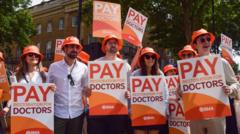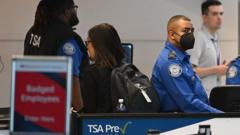What’s Behind the Resident Doctor Strike and Their Salaries?

Published: 2025-11-14 01:00:26 | Category: technology
The upcoming strike by resident doctors in England, scheduled between 14 and 19 November, represents the 13th walkout since March 2023, continuing a long-running dispute over pay and working conditions with the government. The British Medical Association (BMA) argues that despite recent pay rises, real wages have fallen significantly since 2008, prompting this action that could affect patient care across the NHS.
Last updated: 14 November 2023 (BST)
What’s happening now
Resident doctors in England are gearing up for a strike that will run from 0700 on Friday, 14 November, to 0700 on Wednesday, 19 November. The BMA has stated that this action is necessary due to insufficient pay increases and poor working conditions, despite the government claiming that resident doctors have received nearly 30% in pay rises over the past three years. This strike is particularly significant as resident doctors represent about half of the workforce in the NHS, potentially disrupting patient care, including in A&E and GP surgeries.
Key takeaways
- The strike will occur from 14 to 19 November 2023.
- Resident doctors are in a dispute with the government over pay, with the BMA claiming real wages have decreased since 2008.
- The NHS is urging patients to seek care as usual, with most planned appointments expected to proceed.
Timeline: how we got here
The strike action follows a lengthy history of disputes regarding pay and working conditions for resident doctors. Key milestones include:
- March 2023: The first strike is called by the BMA.
- August 2023: A 22% pay increase is announced for resident doctors over two years.
- February 2024: A significant number of appointments are cancelled due to ongoing strikes.
- November 2023: The upcoming strike is scheduled, marking the 13th since March.
What’s new vs what’s known
New today/this week
The imminent strike is the latest development in an ongoing dispute over pay and working conditions. The BMA has reiterated its position, stating that despite recent increases, pay remains significantly lower in real terms than in previous years, particularly when adjusted for inflation using the Retail Prices Index (RPI).
What was already established
It has been established that resident doctors are essential to the NHS workforce, providing care across various departments. Their pay structure has been contentious, with many arguing that the increases do not adequately reflect the years of education and training required to qualify as a doctor. The government maintains that the pay rises are fair based on the Consumer Prices Index (CPI) measure.
Impact for the UK
Consumers and households
The strike is likely to disrupt healthcare services across the UK, particularly for patients needing urgent care. While the NHS has stated that most planned appointments and surgeries will proceed, the reality may differ as hospitals often face staffing shortages that can lead to cancellations. Vulnerable patients, especially those with chronic conditions or requiring regular monitoring, may experience delays in care.
Businesses and jobs
With resident doctors making up a considerable portion of the NHS workforce, the strike could necessitate temporary measures that affect healthcare delivery. The ongoing disputes may also influence recruitment and retention strategies for the NHS, as potential candidates weigh the working conditions and pay against other career opportunities.
Policy and regulation
The ongoing strikes reflect broader issues within public sector pay and working conditions in the UK. The BMA has indicated that without a satisfactory multi-year pay deal, strikes may continue. The government’s approach to public sector pay, particularly in healthcare, is likely to face scrutiny in light of these disputes.
Numbers that matter
- 507,000: Estimated number of appointments and operations cancelled or rescheduled during previous strikes.
- £38,831: Basic salary for resident doctors in their first foundation year.
- £73,000: Potential salary after eight years as a resident doctor.
- 30,000: Number of applicants for specialist training positions, with only 10,000 roles available.
- 20%: Percentage by which the BMA claims resident doctors' pay has fallen in real terms since 2008.
Definitions and jargon buster
- BMA: British Medical Association, the trade union representing doctors in the UK.
- RPI: Retail Prices Index, a measure of inflation that the BMA argues is more relevant to the financial realities faced by resident doctors.
- CPI: Consumer Prices Index, the government's preferred measure for calculating public sector pay increases.
How to think about the next steps
Near term (0–4 weeks)
In the immediate future, patients should prepare for potential disruptions to services during the strike. It is advisable to check with NHS services for the latest updates regarding appointments and availability of care.
Medium term (1–6 months)
Looking ahead, the outcome of the strike may influence further negotiations regarding pay and working conditions within the NHS. A resolution could lead to a more stable environment for resident doctors and potentially better patient care.
Signals to watch
- Government announcements regarding pay negotiations and any potential settlements.
- Updates on patient care services during the strike period.
- Future strike actions planned by the BMA based on the government's response to demands.
Practical guidance
Do
- Stay informed about the strike schedule and any changes to your appointments.
- Utilise NHS 111 for non-life-threatening health concerns during the strike.
- Prepare for potential delays if you require urgent medical attention.
Don’t
- Do not ignore symptoms or delay seeking emergency care if needed.
- Do not assume that all appointments will proceed as scheduled; check with your provider.
- Do not disregard the potential impact of the strike on NHS services in your area.
Checklist
- Confirm your appointment status in advance of the strike dates.
- Have an emergency plan in place for any urgent health issues.
- Familiarise yourself with the NHS 111 service for guidance during the strike.
- Monitor updates from the NHS regarding service availability.
- Consider your options for healthcare delivery if your usual provider is affected.
Risks, caveats, and uncertainties
As the situation evolves, factors such as potential government responses to the BMA’s demands and the public’s reaction to the strike may influence future developments. There is also uncertainty regarding the long-term impact on NHS services and whether the government will consider further pay adjustments in light of the ongoing discontent among resident doctors.
Bottom line
The strike by resident doctors highlights the ongoing tensions between healthcare professionals and the UK government over pay and working conditions. As the NHS braces for potential disruptions, it remains crucial for patients to stay informed and prepared for changes in service availability during this period of industrial action.
FAQs
Why are resident doctors striking?
The upcoming strike by resident doctors is due to ongoing disputes over pay and working conditions, with the BMA arguing that real wages have fallen significantly since 2008.
How will the strike affect NHS services?
The strike is expected to disrupt services, although the NHS aims to maintain a minimum level of planned activity. Patients should verify the status of their appointments ahead of time.
What are the salary expectations for resident doctors?
Resident doctors initially earn around £38,831, with potential earnings rising to £73,000 after several years, depending on their training and experience.



